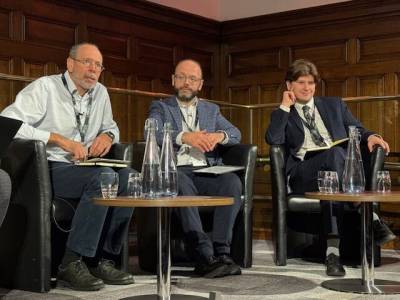The UK government’s ambitions for artificial intelligence (AI) will depend not only on technology and talent, but on how it partners – and who it partners with.

That was the message from a discussion this week at Think AI for Government where speakers from government and the private sector (pictured) argued that collaboration with small and medium enterprises (SMEs) can unlock agility, innovation and trust – but only if government learns to engage differently.
Opening the discussion, it was clear that smaller, homegrown companies have a critical role to play in government’s AI transformation. “As an SME, we find quite high barriers to entry – and those are largely around very risk-averse procurement advice,” explained Chad Bond, director of strategy and Innovation at Zaizi, which helps public sector organisations deliver digital services.
Those barriers, he said, often prevent the public sector from benefiting from the speed and deep expertise SMEs can offer: “We can work faster than they can, for example, with deeper expertise. The challenge is how to create an entry bridge so that government can actually take advantage of that,” he said.
Trust, too, emerged as a recurring theme – not only trust in technology but between partners. “Trust is non-negotiable in national security,” added Bond, pointing to the need for explainability and transparency in AI deployments.
Lessons From Ukraine and Beyond
The panel drew parallels with international approaches to digital government. Ukraine’s ability to rapidly mobilise its digital state capacity during wartime offered a striking example. “Ukraine fundamentally expedited its procurement processes – they had an emergency force procurement system that allowed decisions to be made at pace,” said Bond.
By contrast, the UK’s traditional procurement culture can be slower and more rigid, though reforms are on the horizon.
“We now have new powers from the Procurement Act that allow us to run competitive, flexible procedures and dynamic markets,” said one government contributor. “We can run procurement processes much more quickly – and instead of structuring them around rooms of paper documents, we can get providers to offer demos, show tools, and actually see what they’ve built.”
Instead of being bound by lengthy, document-heavy procedures, departments can now run faster, more dynamic competitions – including live demonstrations and prototype testing – to see what providers have actually built.
The panel also highlighted that rethinking procurement is only part of the change needed, and the government’s AI and data teams are increasingly adopting an open-source ethos. This sees them sharing code and tools publicly to strengthen transparency and trust, while allowing other departments, agencies, and even external innovators to build upon what has already been created.
If you liked this content…
Inside the National Crime Agency: A Case for SME Partnerships
Adding a frontline operational perspective, Paul Edmonds, CDO at the National Crime Agency (NCA), described how AI and SMEs are already reshaping the agency’s work.
“There’s a big need for AI in the NCA, particularly in the paperwork and investigation processes,” said Edmonds, who recounted how early reliance on major consultancies had failed to deliver.
“When I was setting up my department, I took the traditional route – I went to one of the big five consultancy firms… and frankly, it was an utter disaster. They had less knowledge of AI than we did, and they were implementing outmoded models based on generic consultancy approaches.”
That experience, he said, led to a decisive shift toward smaller, more agile partners.
“One thing that came really clear to me was that building a supply chain with more SMEs was one of the top three things I needed to do to reconfigure the organisation.”
Why? “The way partnerships work is different – our more traditional supplier base couldn’t actually do that kind of agile, collaborative working. And secondly, the specialist knowledge in the SME marketplace is far deeper than in our existing supplier space.”
“Government Needs to be a Smarter Buyer”
A recurring theme of the discussion was the need for government to strengthen its own capability if it wants more effective partnerships. The panel suggested a shift from a transactional, compliance-based approach to one of intelligent collaboration, where public and private partners share goals and technical understanding rather than simply exchanging contracts.
And no discussion of AI partnerships would be complete without addressing the skills gap. Three levels of skills and training within government were suggested:
- Basic AI literacy for all civil servants, so everyone can confidently use AI tools in their day-to-day work
- Leadership capability, to ensure decision-makers understand both the opportunities and risks of AI
- Deep technical expertise, enabling subject-matter specialists to build or adapt their own solutions rather than relying solely on external suppliers
The panel closed with a reminder that for the UK to realise AI’s potential in public service, it must rethink how it works with those best placed to deliver innovation. That means recognising that when it comes to AI, SMEs aren’t just suppliers, but partners.







